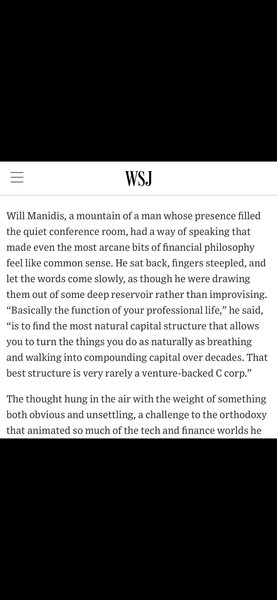Sublime
An inspiration engine for ideas
Due to the absence of a reasonable and healthy relationship of participatory cooperation between the capitalist [creditor] and the entrepreneur [debtor], the global economy suffers tremendously and faces alternative highs and lows that adversely affect the world’s economic health.
Sacha Meyers • Bitcoin Is Venice: Essays on the Past and Future of Capitalism
TL;DR: I spent hours last night breaking down the cap table and deal dynamics from public info. I realized that the unvested equity is $80-100M, awfully close to the $100M the founders & board negotiated to leave behind in the bank.
Why shouldn't management just
- accelerate everyone's... See more
hari raghavanx.com
I have been fascinated by the @HindenburgRes $IEP situation, and there are some interesting learnings here. For example, one learns from $IEP that a controlling shareholder of a company with a small float that pays a large dividend can cause his company to trade at a large premium to intrinsic value, best approximated in $IEP by its NAV per share.... See more
Bill Ackmanx.com

Change time horizons and liquidity:
1. More evergreen funds
2. Strategic investors doing more M&A; more IPO comparables
3. More ‘state-run capitalism’ (Potentially) https://t.co/YUsoD4bu5L

NEW ODD LOTS:
It's @jimcramer on the retail revolution.
@tracyalloway and I talked to the Mad Money host about his new book, the case for picking individual stocks, his career, his time as a Trotskyite, the time he lead a wildcat strike, and much more. https://t.co/flx1HafQrA... See more
Jack Morgan might have the minds of other American bankers, but Ivar had the hearts of American investors, and those investors now had the power. Ivar didn’t need to lend his own money to France. Instead, he could act as an intermediary, raising money from the Americans and lending their money.
Frank Partnoy • The Match King: Ivar Kreuger, The Financial Genius Behind a Century of Wall Street Scandals

🚨🇺🇸🇨🇳 THE SOCIALIST BILLIONAIRE: HOW NEVILLE SINGHAM BUILT A GLOBAL LEFT-WING EMPIRE
When Neville Roy Singham sold his software company Thoughtworks to Apax Partners in 2017 for an estimated $785 million, he didn't retire to a yacht.
He moved to Shanghai and built something far more... See more
